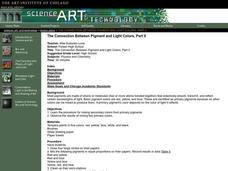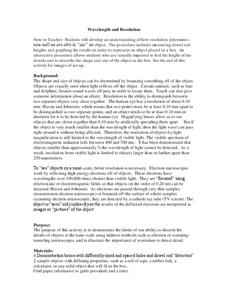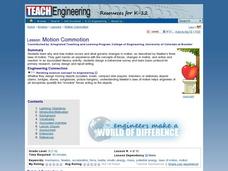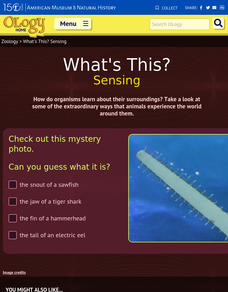Curated OER
How Do Bats Navigate At Night?
Through an experiment, learners explore how bats use echolocation. First, they discuss how sound travels through air waves. Then, they talk about the ways bats navigate in the dark. As an extension, they can write about what they have...
Curated OER
Find The Other Half
In this science worksheet, learners interpret the graphs for the information that is related to measuring the different wavelengths for light or sound.
Curated OER
Electromagnetic Spectrum
Students define electromagnetic radiation, list major categories and uses of electromagnetic waves, identify potential health risks with electromagnetic waves, and demonstrate understanding of Plank's constant by solving quantitative...
Curated OER
Reflection, Refraction & Lenses
Learners are able to describe what happens to light when it strikes different materials. They describe the law of reflection. Students are able to explain why a mirror froms a virtual image. They are able to describe diffuse reflection.
Curated OER
Physics 210 - Frequency
In this frequency worksheet, students use the speed of sound to determine the frequency in which sounds are heard in 5 different word problems.
Curated OER
The Space Cadet's Laboratory: Using Electromagnetic Energy to Study Astronomy
Students build their own spectrophotometer to study light. In this physics lesson, students explain the dual nature of light. They calculate the angle of incidence and refraction using Snell's law equation.
Curated OER
Life of Thomas Edison
Students research the life of Thomas Edison. In this Thomas Edison lesson, students explore major life events of Thomas Edison. Students investigate the inventions of Thomas Edison. Students discover how various fields of study...
Curated OER
The Connection Between Pigment and Light Colors
Students learn the procedure for mixing secondary colors from primary pigments and observe the results of mixing two primary colors.
Curated OER
The Speed of Galaxy Q2125-431
In this speed of a galaxy worksheet, learners use a given equation for the speed of an object and they use the spectral lines for Hydrogen Alpha and Beta from the Seyfert galaxy to answer 6 questions. They determine the observed...
Curated OER
Energy Defined
Fourth graders complete activities to study the sources of energy and forms. In this energy lesson plan, 4th graders discuss the origin of energy and define it. Students participate in several experiments to further study energy...
Curated OER
Harmonic Motion
In this waves worksheet, students review the characteristics of harmonic waves including amplitude, cycle, phases, and friction. This worksheet has 37 problems to solve.
Curated OER
Tune Up Your Ears!
Students discuss meaning of pitch, listen for different sounds in classroom, hallway, and outdoors, and listen to sounds played on piano and on computer to determine high or low pitch.
Curated OER
Wavelength And Resolution
High schoolers perform a simulation of the workings of an electron microscope to discover that the resolution will need to improved to detect objects in the nano-scale. They use wooden dowels as detectors to determine the shape of...
Curated OER
Convection Currents
Students explain and understand the circulation of air in the atmosphere. They identify that energy can be carried from one place to another by heat flow or by waves, including water, light and sound waves, or by moving objects. ...
Curated OER
Climate And the Greenhouse Effect
Young scholars demonstrate the greenhouse effect. They recognize that relatively small changes to our environment can stimulate significant climate changes. They determine that the "scientific method" is a process of testing hypotheses...
Curated OER
Rat Round Up
Students build a device that captures and carries a pet rat safely back to its cage with out "harming" the rat or themselves. They build and experiment with wind-up or battery operated rat cat toys after predicting the outcome of their...
Curated OER
Circle of Pong
Students, in groups, use given materials to devise a way to deposit a ping-pong ball into a paper cup that is located in the middle of a 6-foot diameter circle, while standing outside the circle.
Curated OER
Design a Bobsled
Students apply their knowledge of friction, drag, mass and gravity as they design, build, and test mini-bobsleds.
National Energy Education Development Project
The Science of Energy
Did you know the word energy comes from energeia, a Greek word? Introduce learners to the four types of potential energy, five types of kinetic energy, and energy transformation with a presentation about where we get our energy and...
Curated OER
Free Up the Ketchup!
Students, in teams, use given materials and their knowledge of Newton's First Law to create a device that will remove a sticky ping pong ball from a 16-oz. cup (which represents ketchup stuck in a bottle.)
Curated OER
Motion Commotion!
Students explore the drawings of Rube Goldberg to design and construct a simple machine. They discuss simple machines, and using various materials and toy parts, design and construct a "Rube Goldberg" style machine to ring a bell.
Curated OER
Energy At Play
If you can find Tinker Toys™, then this may be a fun assignment for your physical science class. Using the construction set and a few other toys, they examine the forces involved when it they are being played with. For each, they...
American Museum of Natural History
What's This? Sensing
There is a scallop that relies on sight so much that it actually has more than 100 eyes! There are many species that rely heavily on one sense or another. An online interactive resource has youth read about several of these animals. The...
Curated OER
Determining Red-Shift in a Receding Star
Students practice manipulating algebra formulas with more than one variable. They examine the topics of velocity, wavelength and frequency. They determine the amount of red-shift in a receding star.

























